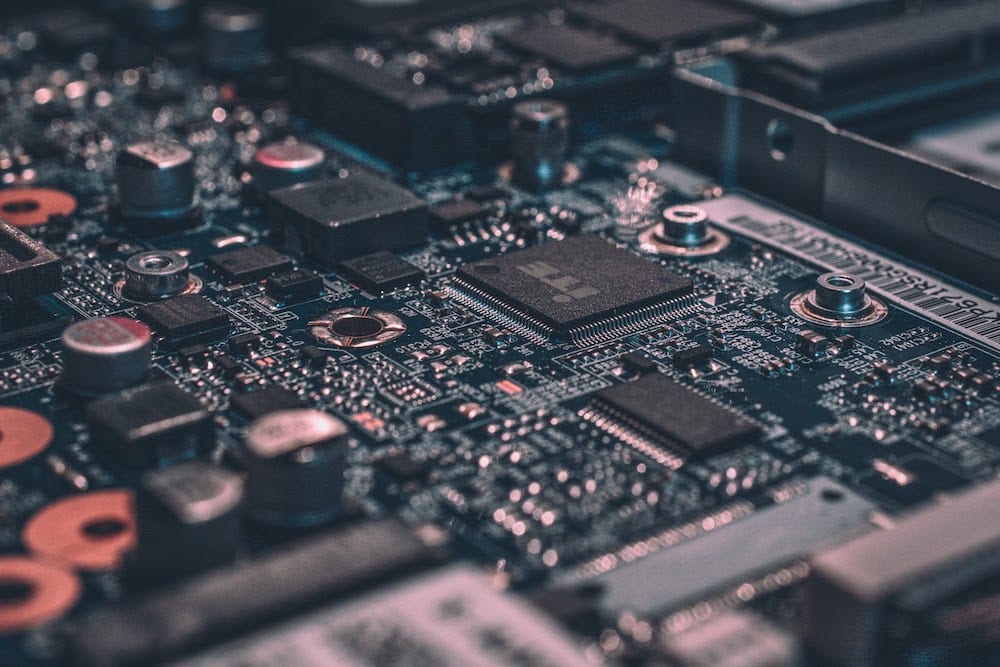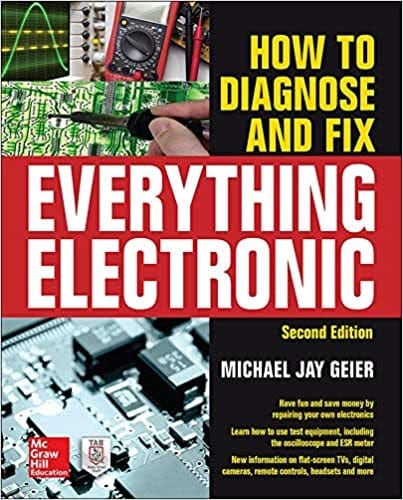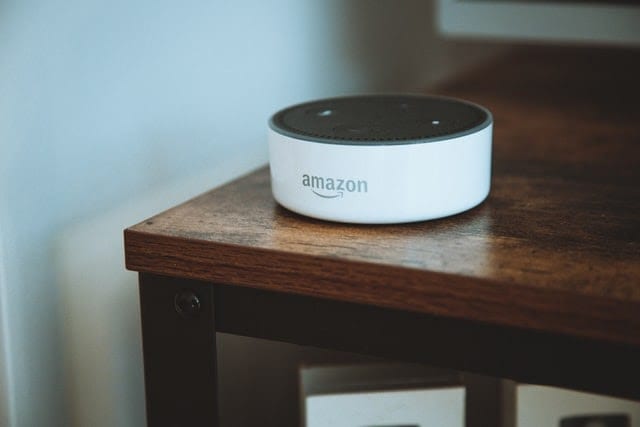It’s electric! Not the song, we’re talking about the tiny electrons directed around circuits. What does this process mean in the real world? It turns out it means a lot.
Electrons help operate your cell phone, video games, and even the airbags in your car. Learn how electronics make a difference in your life and the steps to start studying the electronics field below.
What Is Electronics?
Electronics is a branch of physics and technology concerned with the design of circuits utilizing transistors and microchips, among other parts. Electronics is based on the behavior and movement of electrons and their emission, flow, and control in a vacuum or through matter.
So, what’s the difference between electrical and electronic? Electricity is when electromagnetic energy flows around a circuit. This is on display in an electric motor or even your toaster. But electronics refers to processes where tiny electric currents are directed around complex circuits. It’s a subtle difference.
What Are Electronics Used For?
You might not have realized it, but electronics are part of your everyday life. Using a cell phone, browsing the Internet, and going to the hospital all involve the use of electronics. What else are electronics used for? Find more examples below.
- Consumer electronics. These are bought for personal use, rather than commercial, and consist of phones, laptops, TVs, and much more.
- Medical electronics. This includes equipment such as MRI machines, CT scanners, X-ray machines, and much more.
- WiFi and the Internet. One of the most breakthrough technologies of our time, WiFi and the internet wouldn’t be possible without electronics.
- Food. Here is some food for thought. Many modern machines used to produce food wouldn’t be possible without electronics.
Types of Electronics
Several different components make up an electronic device. Some of those components include a microcontroller, transformer, battery, fuse, relay, switch, motor, and circuit breaker. Explore some of these terms below.
Power Supply
A power supply is an electrical device that supplies power to an electric load.
Integrated Circuits
These are circuits formed from semiconducting material on a small scale.
Op-Amp Circuits
This is an integrated circuit that can amplify weak signals.
Microcontroller
A microcontroller is a small computer on a metal-oxide-semiconductor integrated into a circuit chip.
Learning Electronics
Just the idea of learning electronics can seem like an insurmountable task for many. But in actuality, learning electronics can be done by anyone, anywhere.
However, you have to be willing to put in the hours. A step-by-step introductory guide is a great way to start. After that, tutorials, courses, and hands-on applications are all helpful additional steps.
How Long Does Electronics Take to Learn?
The time it takes to learn basic electronics can depend on several factors, including choosing the self-taught route or enrolling in a guided course. How you want to apply the knowledge you learn is another factor to consider. For example, are you learning because you’re interested in the subject? Or do you want to make a career out of this new skill?
In addition, you can also attend a university to study electronics in either a two-year or four-year program. Overall, learning electronics is a process that will constantly need updating due to ever-changing technology.
How to Learn Electronics: Step-by-Step
Electrical engineering can sound incredibly daunting. But don’t be intimidated. Follow these steps to get on the fast track to learning about electronic circuits.
1. Master the closed-loop. First things first. To move on you must first master the closed-loop. A closed-loop t is essential for making any circuit work. And after you master this you will better understand the inner workings of simple circuits.
Additionally, once this is accomplished, you will be able to identify one of the most common mistakes in building circuits: a missing connection. Some basic electronics knowledge is imperative to learn before moving on to more complicated steps.
2. Learn about voltage, current, and resistance. Now, you must learn how voltage pushes, resistance resists, and current flows inside of a circuit.
3. Start building. You’re ready! You can start building circuits. Using circuit diagrams found online, begin creating. Remember, practice makes perfect.
4. Get a basic understanding of a few topics. The resistor, LED, capacitor, and transistor are a few of the common components that you should start mastering now. While pursuing learning materials, keep in mind that you should be able to identify how these parts work inside of a circuit.
5. Gain more experience. Start experimenting using the transistor as a switch. The transistor is one of the most important parts of a circuit. Additionally, you will identify how lights, buzzers, and motors work with the transistor after completing this step.
6. Learn to solder. Learning to solder isn’t required. However, soldered electronics last longer and look better.
7. Study diode circuits and capacitors. You’ve made it so far. Now build on your knowledge by learning how diodes and capacitors work in a circuit.

"Career Karma entered my life when I needed it most and quickly helped me match with a bootcamp. Two months after graduating, I found my dream job that aligned with my values and goals in life!"
Venus, Software Engineer at Rockbot
8. Build using integrated circuits. Build on your progress even more by uncovering how to add sound, memory, and intelligence.
9. Design a Circuit Board. Time to build your circuit board using the previous steps and other resources.
10. Learn about microcontrollers. Build the electric circuits you want by mastering microcontrollers. Instead of having a circuit of components, you will create a few lines of code that can do the same task after this step. You will also be able to use a microcontroller in your projects.
The Best Electronics Courses

Now that you know the steps for becoming a circuit-building expert, you might want to explore some options for courses. Online, in-person, and free classes are all taught in this exciting subject. Find some options below.
Best In-person Electronics Courses
In-person classes are a great idea when studying electronics since the subject is so hands-on. Explore some in-person options below or search for courses near your specific area.
My Next Move
- Electronics Courses
- Prerequisites: Varies
- Price: Varies
- Time: Varies
Find a variety of courses on electronics through My Next Move. Sort through programs by length and location to find the perfect fit.
Coursehorse
- Electronics Courses
- Prerequisites: Varies
- Price: Varies
- Time: Varies
Coursehorse has many electronics classes to choose from in the New York City area. Find a course that is perfect for you, depending on your preferred topic and price.
Best Online Electronics Courses
Online courses are having a moment and for good reason. You can advance your career, start a new hobby, or learn a life-changing skill like electronics without leaving your bed. Join the online revolution with some of these electronics class options below.
Udemy
- Crash Course Electronics and PCB Design
- Prerequisites: High School equivalent of math, a modern Windows PC (or virtual machine) capable of running various CAD and design tools like Altium CircuitMaker, Labcenter Proteus and Matlab.
- Price: $99.99
- Time: 103.5 hours
Learn electronics from the ground up in this university-level crash course. Ohm’s Law, circuit analysis, and digital theory are all covered in this exciting class. The instruction is taught by computer scientist, author, and embedded engineer, Andre LaMonthe. You can earn a certificate at the end of the course.
edX
- Electronics Courses
- Prerequisites: None
- Price: Varies
- Time: Varies
If you’ve ever wanted to study at the Ivy Leagues, then now is your chance. EdX teaches a variety of courses brought to you by these universities. Learn about circuits, robotics, and more from these classes.
Free Electronics Courses
Free basic electronics courses are a great idea if you are new to the subject, looking for a refresher, or even if you are an advanced learner. Explore some free courses below.
Coursera
- Introduction to Electronics
- Prerequisites: None
- Price: Free
- Time: 46 hours
Georgia Tech offers this free online course through Coursera. You will learn the essential components of electronics, including op-amps, diodes, and transistors. Basic application and common operations will be covered by two leading professors in the field.
Alison
- Introduction to Basic Electronics
- Prerequisites: None
- Price: Free
- Time: 4-5 hours
The Introduction to Basic Electronics course covers just that. Additionally, theorems that coincide with the design of electrical circuits will be covered. Those who wish to learn the history of electronics and the fundamentals should enroll in this course.
Best Electronics Books
If you want to advance your electronics skills, you can never study or read enough material. Below are just a few of the books you might consider picking up. Of course, these examples only skim the surface of resources available.
The Art of Electronics, Paul Horowitz

A revised and updated version of the ever-popular Art of Electronics includes new and advanced coverage of many topics. This book is designed for anyone who works with electronic circuits and includes photos, graphs, and datasheets needed when designing circuits.
Make: Electronics (Learning by Discovery), Charles Platt

Learn the fundamentals of electronics in Make: Electronics. Throughout the book, you will build circuits and learn theories behind the technology. The pages are filled with step-by-step instructions, illustrations, concepts, and techniques.
How to Diagnose and Fix Everything Electronic, Second Edition, Michael Geier

Learn to repair electrical products with How to Diagnose and Fix Everything Electronic. Discover case studies, insights, and step-by-step instructions in this DIY guide.
Best Electronics Resources
There are many resources available on the subject of electronics, especially if you would like to be a teacher. Explore some resources below.
Circuit Playground
If you’re a teacher or have children, spark an interest in electronics with this resource. Circuit Playground is a series of YouTube videos that teach how circuits work starting at the letter A.
Science Snacks
Science snacks are bite-sized, information-filled experiments for a variety of different ages. Hands-on, teacher-approved activities await you with Science Snacks.
Electronics Teacher
Electronics Teacher offers a variety of publications, journals, catalogs, formulas, and dictionaries on electronics.
Should You Study Electronics?

Even though electrons may be tiny, they make a huge difference in the world. Monitoring a heartbeat, using Bluetooth, and even guiding airplanes to land show electronics at work. More straightforward tasks like cooking your food, sending a photo, and playing a song on Alexa are also examples in our electronic world.
If you wish to pursue electronics as a career, there are many opportunities available for you. You can be an electronic technician, electrical engineer, or electrical and electronic installer.
Even if you don’t wish to pursue a career in electronics specifically, there are many different areas where knowledge of electronics can help. But if you feel a connection to this field, then you should pursue it to your fullest capability.
About us: Career Karma is a platform designed to help job seekers find, research, and connect with job training programs to advance their careers. Learn about the CK publication.



